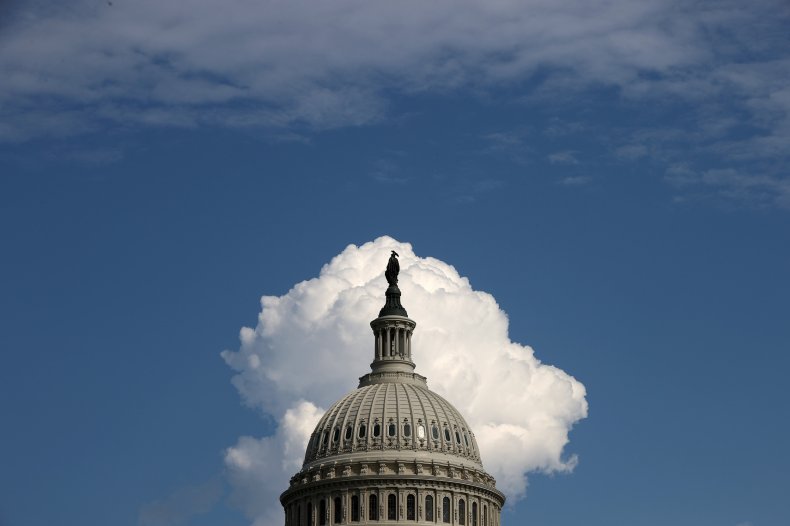U.N. Climate Report is Wake Up Call for U.S. Inability to Fix Government | Opinion
Dealing with climate change is now or never, according to a new detailed U.N.-sanctioned climate report by 234 scientists who analyzed 14,000 studies. U.N. Secretary General António Guterres called the report a "code red for humanity."
Will our democracy rise to the challenge? Democrats in Congress seem willing to throw money at environmental projects, but dealing with climate change requires altering the way we live and work.
Democracies are notoriously inept at taking things away from people.
For decades now, environmentalists have been punching the Washington pillow. They assume that dark forces are preventing change. This gives too much credit to opponents and ignores a far more powerful force: The inertial drive of democracies that resists, except in immediate crisis, changing existing ways of doing things. With great effort, democracy can add programs and benefits, but it almost never disrupts them.
Changing direction is not in the democratic tool kit. The status quo is always supported by multiple interests. It's a lot easier to keep going in the same direction than to disrupt patterns and habits. That's why farm subsidy programs still exist, 80 years after the Great Depression ended.
That's also why health care costs are out of control, schools are unmanageable, rogue police are unaccountable and it takes a decade or longer to get a permit to build new power lines. Unfair public programs don't get fixed because not enough Americans care—so Washington continues to tax Wall Street millionaires at lower rates than manual laborers.
Crisis is required to overcome these inertial forces in a democracy. When crisis hits, such as a war or pandemic, democracies step aside to let people in charge make decisions—such as allocating billions to pharmaceutical companies to develop a vaccine, or converting auto makers to production of planes and tanks during World War II.
Change in a democracy requires that Americans come together in panic or anger. Crisis galvanizes the force of public opinion. Climate change hasn't elicited panic in most Americans, because the crisis occurs in slow motion.
But here's the opening for building public demand: Washington itself is a crisis in slow motion. What environmentalists need is to harness broad frustration with Washington into a broad change coalition. It's hard to find any responsible segment of America that doesn't think Washington is broken. Failing schools, rising health care costs, paralytic red tape ... these persistent failures are why two-thirds of Americans favor "major structural changes" in government.

Public frustration has boiled over in recent years in populist movements on all sides, including the Tea Party movement, Occupy Wall Street and Black Lives Matter. Channeling this anger into a coalition for change would provide common ground not only for environmentalists, but parents, caregivers, business leaders, police reformers and many others. All these frustrated Americans should be mobilized in a new movement to reboot Washington.
The failures of modern government reflect structural defects that evolved over decades. None of these can be fixed without pushing the reset button. But Washington will not willingly go along because changing the status quo requires removing what interest groups view as entitlements. Dealing effectively with climate change, for example, not only requires making coal producers, the beef industry and plastic users unhappy, but also removing the veto power of environmentalists who resist fire breaks to control forest fires and block offshore wind farms.
Rebooting Washington not only holds the promise of making things work sensibly, but will also release funds needed to pay for new public programs. Cutting waste in health care, obsolete programs and unnecessary red tape will save, by my calculation, almost $1 trillion annually.
Change can be scary. But not changing can be scarier. That's the real political battle line, in my view. Are you for change or against it? Fear of the unknown can be alleviated by giving nonpartisan "spring cleaning commissions" the job of drawing new visions for how to achieve public goals. These blueprints will become the platform for the new coalition.
The danger I fear is not just climate change, but our own complacency. We can manage climate change, the U.N. report concludes, if we start acting now. But if we collectively feel that democracy on cruise control is tolerable, and continue to do nothing, then political parties will continue to get away with partisan strategies that are designed to do nothing.
America is overdue for big change. Meaningful change always happens in big gulps—what political scientists call "punctuated equilibrium." The 1960s resulted in civil rights, environment reform, safe products and women's liberation. The 1930s resulted in social safety nets, financial regulation and housing support. All these changes were forced by outside pressure.
Outsourcing change to our elected leaders won't work. Focusing on one area of reform—even one as important as climate change—is unlikely to mobilize public demand. We must create a broad new movement of Americans that are fed up with public failures in every area.
Philip K. Howard is founder of Campaign for Common Good. His latest book is Try Common Sense. Follow him on Twitter: @PhilipKHoward.
The views expressed in this article are the writer's own.


